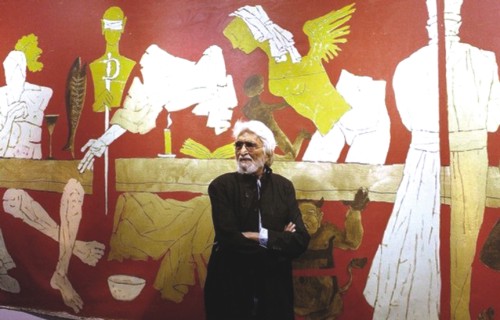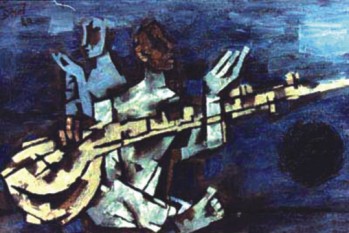Perspective
Hussain's Master Stroke
Zafar Anjum

When news broke that India's pre-eminent painter M F Hussain has traded his Indian passport for a Qatari one, many in India were shocked. On Facebook and Twitter, in newspapers and TV studios, people expressed their sadness and displeasure at Hussain's decision. But many, including some non-resident Indians, even rejoiced. Good riddance, they said.
The itinerant painter has been in self-exile since 1996 after being hounded by the right-wing outfits for his nude paintings of Hindu deities. Frail, at 95, Hussain changes his citizenship. The man could die any day. So what's the big deal?
In his last days, Hussain chooses to die as a Qatari, not as an Indian. That is the big deal.
To me, Hussain's relinquishing his Indian citizenship is nothing less than a national shame, a slap across the face of those Indians who have become so smug in their new-found material success that they have abandoned all regard for freedom of speech or for the larger freedoms constitutionally ensured for citizens in a liberal democracy. And a slap across the face of those who have silently supported them.
It is also a slap across the face of the Indian government that has shown progressive incapability of safeguarding any of its guarantees to the citizen. As Indian journalist Sadanand Menon has noted elsewhere, this has resulted from “democratic deficit,” a Chomskian term for describing the fatal inability of institutions within a democratic state to contribute positively towards sustaining democratic principles. As Menon has written, “caught between daily threats to his life and freedom on the one hand and an impotent state unable to guarantee his protection on the other,” Hussain chose to live abroad in self-imposed exile.
“I still love India. But India doesn't need me. I am saying this with deep pain in my heart,” Husain told Gulf Madhyamam in an interview.
Hussain wanted to return to India. He even apologized to those who might have been offended by his paintings. But the apology was never accepted, the hounding never stopped, the threat persisted. “When Sangh Parivar outfits targeted me, all kept silent. No one, including political leaders, artists or intellectuals came forward to speak for me. But I know the fact that 90 per cent of the people of India love me. They are with me,” Hussain said.
There is a political argument (Brain Barry) that says that in democratic politics, it is better to be lucky than to be powerful. Hussain had neither luck nor power on his side.
“A painter at 90 deserves to be in his home--painting his canvas,” Justice Sanjay Kishan Kaul of the Delhi High Court said in a judgment in 2008, quashing a bunch of cases against Hussain.
Hussain was not allowed to return home.
The lunatic fringe wins again
In Hussain's abdication of his Indian citizenship, the lunatic fringe has won again. The same lunatic fringe that has become the de facto DNA of Indianness, the defining element of a fast-globalizing nation whose bottom feels the pinch only when it experiences an economic injury. These are the same people who call Arundhati Roy a “slut” because she speaks for the rights of the tribals and the minorities. These are the same people who return Narendra Modi to power after watching over the massacre of several thousand Indian (minorities in this case). These are the same people who dance to the tune of the Thackerays in Mumbai, and beat up and even kill other Indians hailing from other states or Indians belonging to linguistic or religious minorities. A shade different, but they are the same people who kick up a storm whenever Taslima Nasreen writes against the Islamic obscurantism.
Many are silent spectators or their tacit supporters. Just look at the reality that obtains in India today. According to Father Cedric Prakash, a human rights activist, a Muslim today, in Ahmedabad, cannot buy a house or own a shop in the western up-market part of the city. Muslims are mostly confined to ghettoes and they live in fear and insecurity. This is the same state that has Modi at the helm, who was touted as prime ministerial material by the likes of the Ambani and Tata and who has a superstar like Amitabh Bachchan to represent the state as its brand ambassador. I hear the same about Mumbai where even well-known film actors such as Shabana Azmi and Emraan Hashmi have been reportedly denied apartment purchases in posh areas.
Every time the lunatic fringe has mounted its attack, it has succeeded, be it the demolition of the Babri Masjid or the Gujarat massacre without the fear of being punished. Today, this lunatic fringe seems to be more powerful than the court and the constitution, the government or its hallowed institutions. If it were not so, why would the injustices continue in a country that calls itself a functional democracy and derides Pakistan for being a failed state?
If Hussain's decision signifies anything, it is this: India, a secular democracy envisioned by Gandhi and Nehru, is a dysfunctional state today. Hussain prefers a non-democratic state like Qatar to a so-called democratic India because what is the use of a democracy and a secular system that does not exist anywhere but on paper only, run by a “master class”, which has, in Menon's words, successfully violated every principle of democratic politics. “I enjoy complete freedom in Qatar. Now Qatar is my place. Here no one controls my freedom of expression. I am very happy here,” the painter said.
 The biggest culprit is the failure of the state to check the rise of the lunatic fringe and to inculcate the right secular and liberal values in its citizens. Nehru believed that communalism will die its own natural death when scientific and technological education is imparted and scientific temper cultivated. In the RSS schools, children are taught that Islam was spread in India by shedding rivers of blood. What will be the values and mindset of such children? The biggest culprit is the failure of the state to check the rise of the lunatic fringe and to inculcate the right secular and liberal values in its citizens. Nehru believed that communalism will die its own natural death when scientific and technological education is imparted and scientific temper cultivated. In the RSS schools, children are taught that Islam was spread in India by shedding rivers of blood. What will be the values and mindset of such children?
By abandoning the state's education system to rot, generations of children have been raised with biased views against the minoritiesso will the state stand up and take the blame for jettisoning its duty of shaping the value system of its citizens? If you don't understand where I'm coming from, simply visit Singapore or meet Lee Kwan Yew. How could he raise a prosperous nation of multi-cultural and multi-ethnic citizens? What values did he foster and promote in the citizenry? For, to quote Russell Hardan, a New York University professor of politics, “it would be wrong in the shibboleth of our time, to say that the institutions could be neutral, that is, that they would have no effect on what values people sought. A massively coercive religious state could have great impact on individual values as seems to be shown by the cases of Iran under the Ayatollas, and of Afghanistan under the Taliban…An individual immersed in a licentious society can find it difficult to sustain personal adherence to a rigidly religious or moralistic value system. Some value systems therefore seem likely to require specific institutional supports, and it is prima facie false to suppose that any institution can be neutral with respect to all values or value systems.” (How Do You Know? The Economics of Ordinary Knowledge, Princeton University Press, 200; p.97.)
Yet, in the long run nothing will happen. After bemoaning Hussain's decision, everything will continue as it. The liberals would move on to the next issue. For the rest, there is no shame, there is no awakening. The sectarian value system will perpetuate unless the state intervenes.
As such, the future of secularism seems to be dark in India as long as the liberalism, that is by and large common in the elite, also gets bedded down in the consciousness of the children of the poor, who go to the god forsaken government schools, who read vernacular or newspapers with biased political views or are harnessed by a criminalized political system for vote-bank politics.
As Asghar Ali Engineer, a prominent Islamic scholar and an activist for inter-faith harmony, says in one of his essays, since most of the key posts in administration, in teaching and in policing, are held by upper-caste Hindu officers, many of whom are under the influence of the RSS ideology, the implementation of secular values and secular spirit of Constitution appears to be wanting.
Though Engineer does not feel that the future of secularism (in India) is despairing in any way, I disagree. If Hussain's decision has shown anything, it is this. I would love to be proved wrong, but it seems that the road to true secularism, along with a clean and effective law and order system in India, is a long way off.
As for those who choose to remain silent, let them remember this: there are collective implications of individual liberty.
Zafar Anjum is a Singapore-based Indian writer and journalist.
Copyright
(R) thedailystar.net 2010
|
